AI Friday: the vapourware edition
The latest news from the intersection of AI, journalism, and techbro hype.

I haven't done one of these AI roundups in a while, in part because my Fridays are nearly as busy as my Wednesdays. In fact, the bones of this post were in place a week ago, I just lacked the energy and drive to turn them into something more fully rounded.
But not this week! This week I shall triumph over both my lethargy and my sense of ennui about the wall-to-wall coverage of AI.
Let me scythe through the jungles of techbro hype, and discover the glorious valley of curated insight. And tortured metaphors, clearly.
Meta AI is coming, honest
You can see the skid marks all over the Meta business plan, and the places where “metaverse” has been Tippexed out and “AI” put in its place. This is why the company keeps announcing things that aren't out yet — and might not be so for years. (Yes, I'm looking at you, oh vapourware glasses.)

But, apparently Meta AI is here in the UK right now. It says so right here in a release note from October 9th:
We’ll be rolling out Meta AI to 21 new locales around the world, starting today with the United Kingdom, Brazil and more countries in Latin America and Asia. It’s coming soon to the Middle East for the first time, too.
Except… well, it's nine days later, and there's no sign of it for me. You see, what they didn't make clear is that it's a gradual rollout. And it ain't graduated to me yet.
How about you?
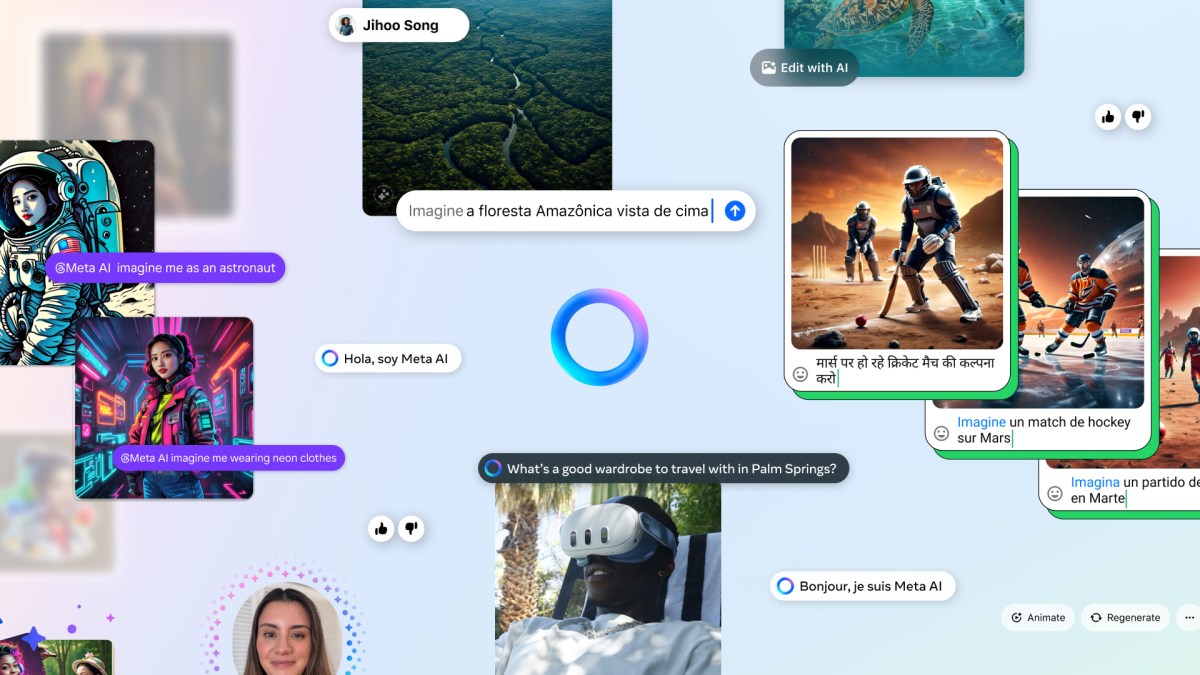
Talking of sort-of-announcements, OpenAI has one too: Canvas!
We’re introducing canvas, a new interface for working with ChatGPT on writing and coding projects that go beyond simple chat. Canvas opens in a separate window, allowing you and ChatGPT to collaborate on a project. This early beta introduces a new way of working together—not just through conversation, but by creating and refining ideas side by side.
You spotted the key word, didn't you? Beta.
But this one, I do have access to!
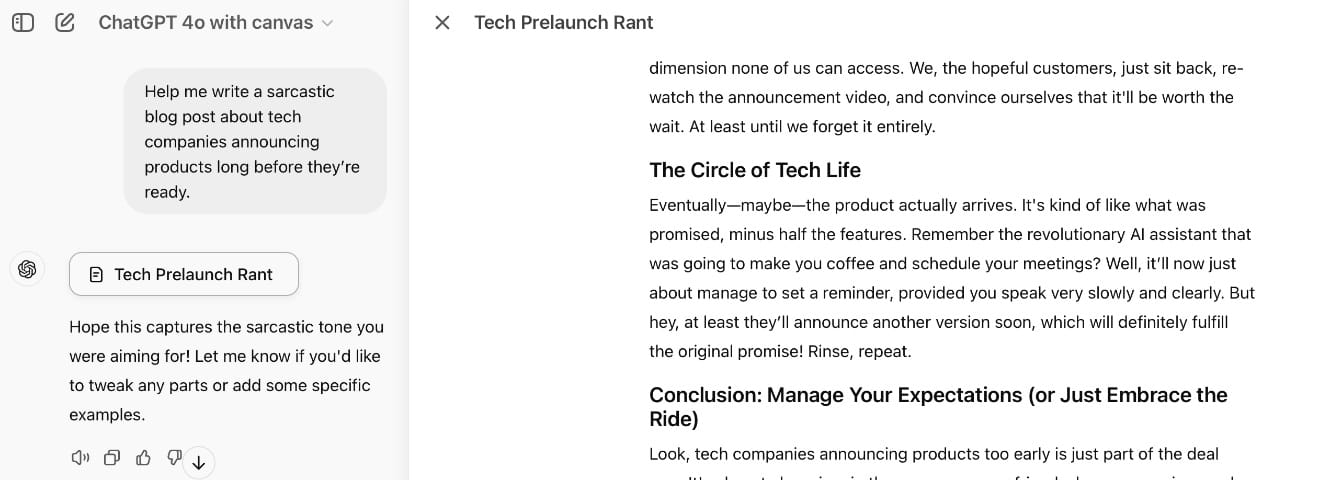
I've not had much chance to explore it yet, but I will, and will report back about this time next week.
So, the launched product I don't have, but the beta product, I do.
Tech Marketing. Whatever world it's from, it's not this one.
Actually useful AI
Good AI! Who's a good non-gendered digital construct then?
Telling very human stories with bots
This I find very interesting. It's an experiment with the form of journalism, using an AI chatbot to tell the story of women trapped in Paraguay's chat trade. Rather than using AI to replace existing human labour, it's using it to build something new; a news experience that's immersive and compelling.
More like this, please.

If you thought human sub-editors were merciless pedants…
Meanwhile, over on the venerable Online Journalism Blog Paul Bradshaw has been running a series of guides on ways to use AI within journalism:
But there are good editors, and there are bad editors. There are lazy editors who don’t care about what you’re trying to achieve, and there are editors with great empathy and attention to detail. There are editors who make you a better writer, and those who don’t.
Generative AI can be a bad editor. Ensuring it isn’t requires careful prompting and a focus on ensuring that it’s not just the content that improves, but you as a writer.
As ever, getting genuine benefit out of AI requires tweaking and challenging your interactions with it — and assessing if you're actually saving time through doing so.
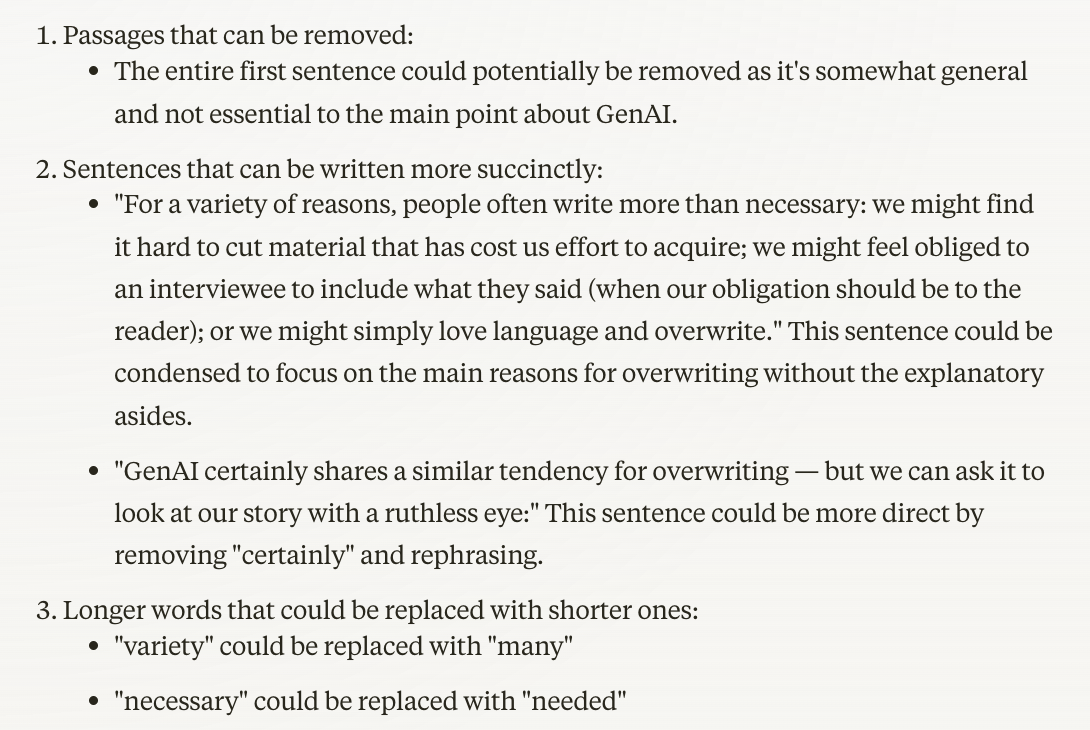
Maybe helpful AI
Despite the Betteridge-adjacent headline there, the idea of a company acting as a form of AI clearing house for authors is an interesting one. AI companies want to train on books. But authors either want to stop that — or get paid for it. It's going to be tricky for authors to manage this individually, and the big publishing houses will probably only find it worthwhile for their major authors.
So, in theory, one organisation that can communicate permissions to the AI, police compliance and get the authors paid seems like a good idea.
Buuuuut…
How this would work in practice for authors is still hazy. Created by Humans, which launched in June with $5 million in funding from investors, hasn’t revealed a precise payment model, and Adler declined to elaborate on how much authors would potentially make, noting that the market is still nascent.
Oh, look, another announcement of something that's not ready yet. Huzzah.

Actively harmful AI
Bad AI! Bad!
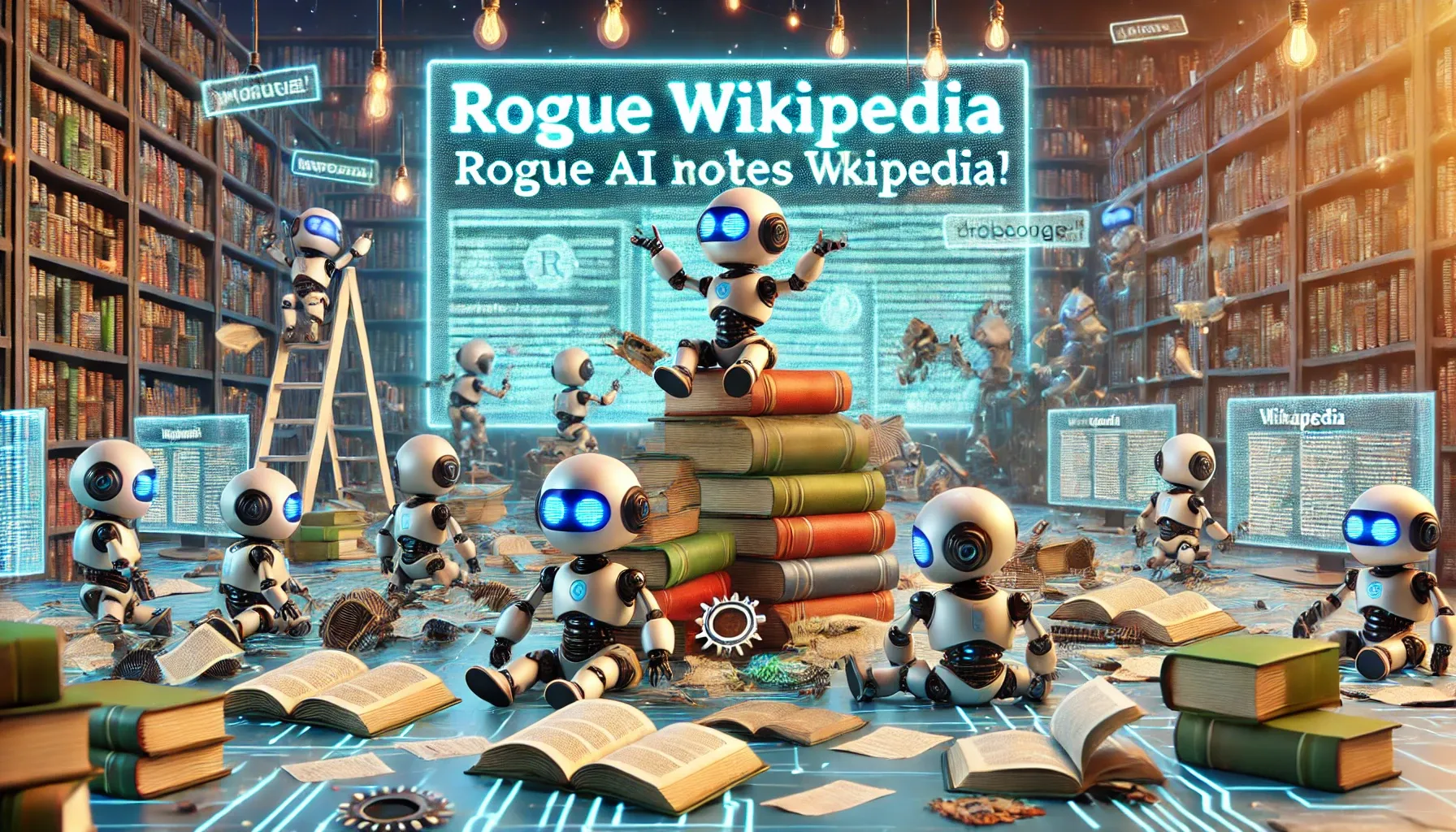
The Anti-AI vigilantes on Wikipedia
Aw, guys, why would you do this? What possible benefit to humanity is there in stuffing Wikipedia with AI-created slop?
“A few of us had noticed the prevalence of unnatural writing that showed clear signs of being AI-generated, and we managed to replicate similar ‘styles’ using ChatGPT,” Ilyas Lebleu, a founding member of WikiProject AI Cleanup, told me in an email. “Discovering some common AI catchphrases allowed us to quickly spot some of the most egregious examples of generated articles, which we quickly wanted to formalize into an organized project to compile our findings and techniques.”
Thank goodness for the volunteers cleaning up — although I foresee future strife, when a human editor's work gets accidentally swept up in a cleanup.
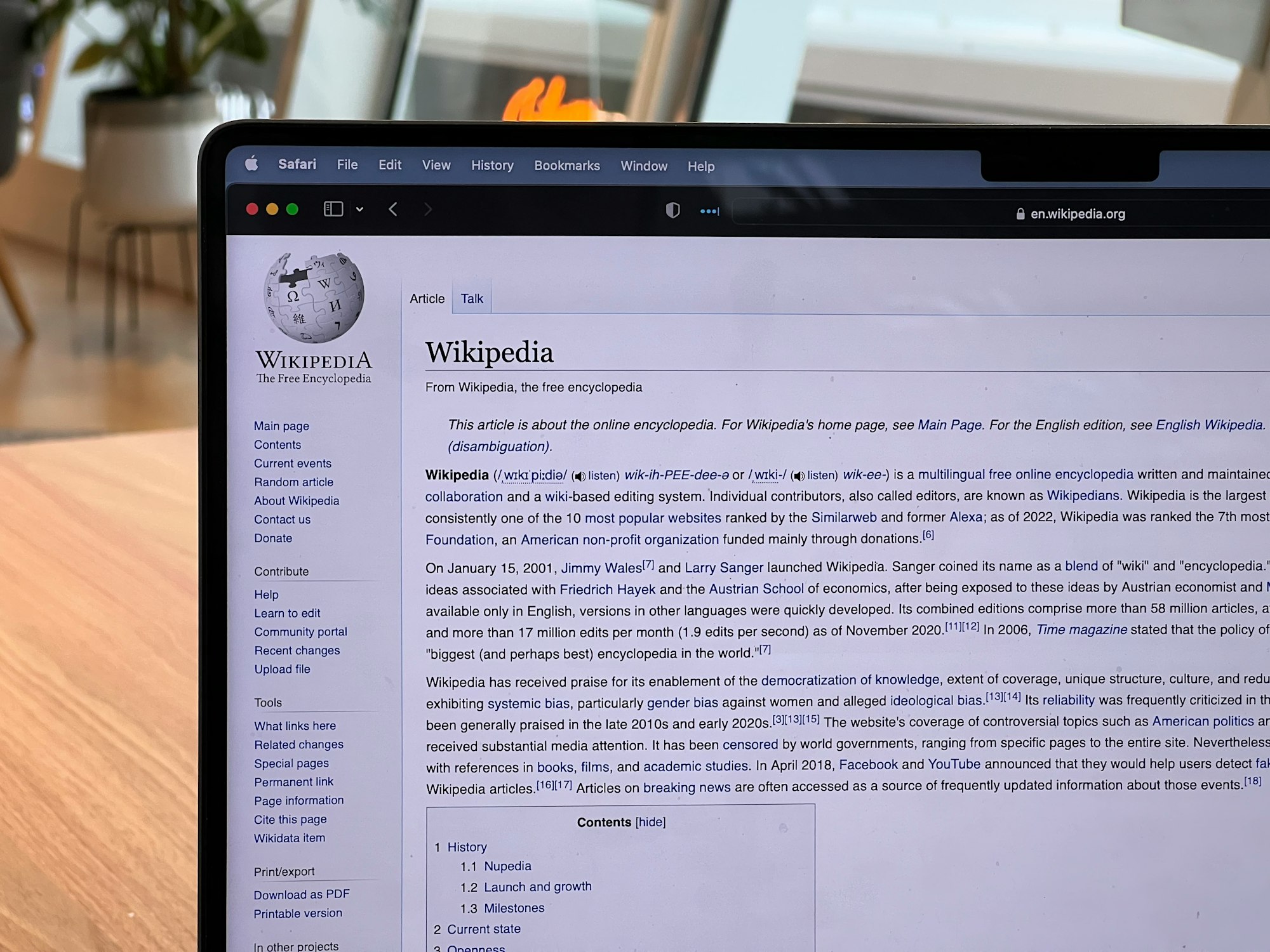
Today in stupid business models
Shot:
“I know! I can make lots more ad revenue by generating article with AI in bigger volumes!”
Chaser:
According to details surfacing online, ad management firm Mediavine is terminating publishers’ accounts for overusing AI.

And finally… is AI doomed?
AI needs insane amounts of computational power, which means chips, which means boom time for NVIDIA's stock price. But it also requires colossal amounts of energy and water (for cooling), and that infrastructure doesn't come cheap. It has a huge environmental cost, which the AI companies really don't want to talk about.
But it has a financial cost as well:
All of this infrastructure will be extraordinarily expensive, requiring perhaps trillions of dollars of investment in the next few years. Over the summer, The Information reported that Anthropic expects to lose nearly $3 billion this year. And last month, the same outlet reported that OpenAI projects that its losses could nearly triple to $14 billion in 2026 and that it will lose money until 2029, when, it claims, revenue will reach $100 billion (and by which time the miraculous AGI may have arrived). Microsoft and Google are spending more than $10 billion every few months on data centers and AI infrastructure. Exactly how the technology warrants such spending—which is on the scale of, and may soon dwarf, that of the Apollo missions and the interstate-highway system—is entirely unclear, and investors are taking notice.
Could it be that the costs of this technology outweigh the value it generates? That's a question that VC funding is obfuscating for the time being. But it's certainly one we should be asking…













